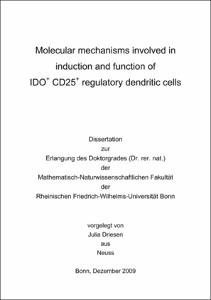Molecular mechanisms involved in induction and function of IDO+ CD25+ regulatory dendritic cells

Molecular mechanisms involved in induction and function of IDO+ CD25+ regulatory dendritic cells

| dc.contributor.advisor | Schultze, Joachim L. | |
| dc.contributor.author | Driesen, Julia | |
| dc.date.accessioned | 2020-04-15T17:16:14Z | |
| dc.date.available | 2020-04-15T17:16:14Z | |
| dc.date.issued | 16.07.2010 | |
| dc.identifier.uri | https://hdl.handle.net/20.500.11811/4620 | |
| dc.description.abstract | The main focus of this study was the characterization of the molecular mechanisms that are involved in the induction and function of regulatory dendritic cells (DCreg) which can be found in the environment of different tumors as well as in chronic infections. It was shown that co-expression of the tryptophan-catabolizing enzyme indoleamine-2,3-dioxygenase (IDO) and the α-chain of the IL-2 receptor (CD25) is one of the major hallmarks of DCreg, induced either by treatment with the tumor-derived factor PGE2 in combination with the maturation stimulus TNF or by infection with the Gram-positive bacteria Listeria monocytogenes. Induction of IDO in DCreg is functional and leads to the deprivation of the essential amino acid tryptophan as well as an accumulation of its toxic metabolites, namely kynurenine. CD25 is also secreted in a soluble form (soluble CD25) and acts as a IL-2 scavenger, resulting in reduced amounts of accessible IL-2 for T cells. It was demonstrated that IDO+ CD25+ DCreg are able to suppress T-cell proliferation and that this inhibition is dependent on the effects of a variety of inhibitory molecules including IDO, CD25, IL-10 and COX-2 which act in concert to mediate the suppressive function of DCreg . Only the simultaneous blockade of all these inhibitory factors could reverse T-cell suppression. Notably, knockdown of IL2RA, the gene encoding CD25, restored the proliferative capacity of T cells co-incubated with DCreg pointing towards an important role of CD25 expression and subsequent IL-2 deprivation in DCreg mediated T-cell suppression. Furthermore, the responsible receptors and signaling pathways leading to the induction of IDO+ CD25+ DCreg were investigated. PGE2 mediated induction of IDO and CD25 was dependent on EP2 and EP4 as well as TNFRI. Similarly, induction of DCreg by infection with Listeria monocytogenes is dependent on TNF, yet both TNF receptors are responsible for induction of the regulatory molecules. The analysis of downstream signaling events revealed that PI3K as well as Jak molecules were necessary for induction of IDO and CD25 while inhibition of Gsk-3 differentially affected IDO and CD25 expression. These results suggest a shared Jak-PI3K signaling pathway but different downstream mediators control the induction of IDO and CD25 in DCreg. The work we have established so far in this regard will form the basis for future research on further dissecting the different signaling components required for the induction of regulatory DC. | |
| dc.description.abstract | Das Hauptziel dieser Arbeit war die Charakterisierung der molekularen Mechanismen, die für die Induktion und Funktion von regulatorischen denritischen Zellen (DCreg) verantwortlich sind. DCreg konnten sowohl in der Umgebung verschiedener Tumoren als auch bei chronischen Infektionskrankheiten nachgewiesen werden. DCreg, die durch eine Kombination des tumor-assoziierten Faktors PGE2 mit TNF oder durch Infektion mit dem Gram-positiven Bakterium Listeria monocytogenes induziert wurden, co-exprimieren das Tryptophan katabolisierende Enzym IDO und die α-Kette des IL-2 Rezeptors, CD25. Die Anhäufung von toxischen Metaboliten (Kynureninen) bewies die Funktionalität von IDO in DCreg. Außerdem sezernieren DCreg große Mengen von löslichem CD25 (sCD25). CD25 und sCD25 binden IL-2 und verringern somit die für T-Zellen verfügbare Konzentration an IL-2. Weiterhin wurde gezeigt, dass IDO+ CD25+ DCreg die Proliferation von CD4+ T-Zellen supprimieren. Diese Suppression war abhängig von einer Vielzahl inhibitorischer Faktoren, unter anderem IDO, CD25, IL10 und COX-2, wobei alle genannten Faktoren zusammwirken, um die inhibitorische Funktion der DCreg zu vermitteln. Nur die gleichzeitige Blockade aller inhibitorischer Faktoren hob die DCreg vermittelte T-Zellsuppression auf. Interessanterweise konnte durch den spezifischen “knockdown” von CD25 die stimulatorische Funktion von DCreg ebenfalls wiederhergestellt werden. Dies deutet auf eine wichtige Rolle von CD25-Expression in DCreg vermittelter T-Zell Suppression hin. Außerdem wurden die für die Induktion von IDO+ CD25+ DCreg verantwortlichen Rezeptoren und Signalwege untersucht. Die PGE2-vermittelte Induktion von IDO und CD25 war abhängig von EP2 und EP4 sowie von TNFRI. Auch die Induktion von DCreg durch Infektion mit Listerien war abhängig von TNF, jedoch waren beide TNF Rezeptoren an der Induktion von infizierten DCreg beteiligt. Die Analyse der Rezeptor-assoziierten Signalwege zeigte, dass sowohl PI3K als auch Jak Signalmoleküle an der Induktion von IDO und CD25 beteiligt sind, während die Inhibition von Gsk-3 unterschiedliche Auswirkungen auf IDO und CD25 hat. Diese Ergebnisse weisen auf einen gemeinsamen Jak-PI3K Signalweg hin, wobei jedoch unterschiedliche nachgeschaltete Signalelemente die Expression von IDO und CD25 induzieren. Diese Arbeit kann demnach als Grundlage für die weitere Entschlüsselung von Signalwegen dienen, die für die Induktion von DCreg verantwortlich sind. | |
| dc.language.iso | eng | |
| dc.rights | In Copyright | |
| dc.rights.uri | http://rightsstatements.org/vocab/InC/1.0/ | |
| dc.subject | regulatorische DC | |
| dc.subject | IDO | |
| dc.subject | CD25 | |
| dc.subject | regulatory DC | |
| dc.subject | dendritic cell | |
| dc.subject.ddc | 500 Naturwissenschaften | |
| dc.subject.ddc | 610 Medizin, Gesundheit | |
| dc.title | Molecular mechanisms involved in induction and function of IDO+ CD25+ regulatory dendritic cells | |
| dc.type | Dissertation oder Habilitation | |
| dc.publisher.name | Universitäts- und Landesbibliothek Bonn | |
| dc.publisher.location | Bonn | |
| dc.rights.accessRights | openAccess | |
| dc.identifier.urn | https://nbn-resolving.org/urn:nbn:de:hbz:5N-22180 | |
| ulbbn.pubtype | Erstveröffentlichung | |
| ulbbnediss.affiliation.name | Rheinische Friedrich-Wilhelms-Universität Bonn | |
| ulbbnediss.affiliation.location | Bonn | |
| ulbbnediss.thesis.level | Dissertation | |
| ulbbnediss.dissID | 2218 | |
| ulbbnediss.date.accepted | 29.04.2010 | |
| ulbbnediss.fakultaet | Mathematisch-Naturwissenschaftliche Fakultät | |
| dc.contributor.coReferee | Kolanus, Waldemar |
Files in this item
This item appears in the following Collection(s)
-
E-Dissertationen (4118)




